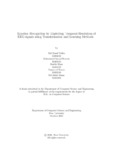Emotion recognition by exploiting temporal resolution of EEG signals using transformation and learning methods
Abstract
Individuals are free to articulate thousands of emotions. Emotion can be associated with feelings articulated by or observable by voice intonation, a facial expression of body language, an initial response from one’s mood relationship with others and most strikingly, a predicament within thus they are. Recognizing sentiments is a daunting task due in part to the non-linear features of the EEG signal. This paper addresses advanced pre-processed DEAP dataset EEG signals for emotional recognition. The valence and arousal components of the raw EEG signal are first retained in the PSD approach Fast Fourier transform (FFT). Power Spectral Density (PWD) consisting four features are being selected for all 32 participants. Features derived from the PSD are considerably less accurate precise. Through implementing 10-fold cross validation on the DWT (discrete wavelet transformation) to get the time-based features, Gradient boosting Classifier gave the best result among six different classifiers. Our proposed method provides 93.12% accuracy by using a benchmark dataset. The results of experiments on DEAP datasets indicate that our system.

